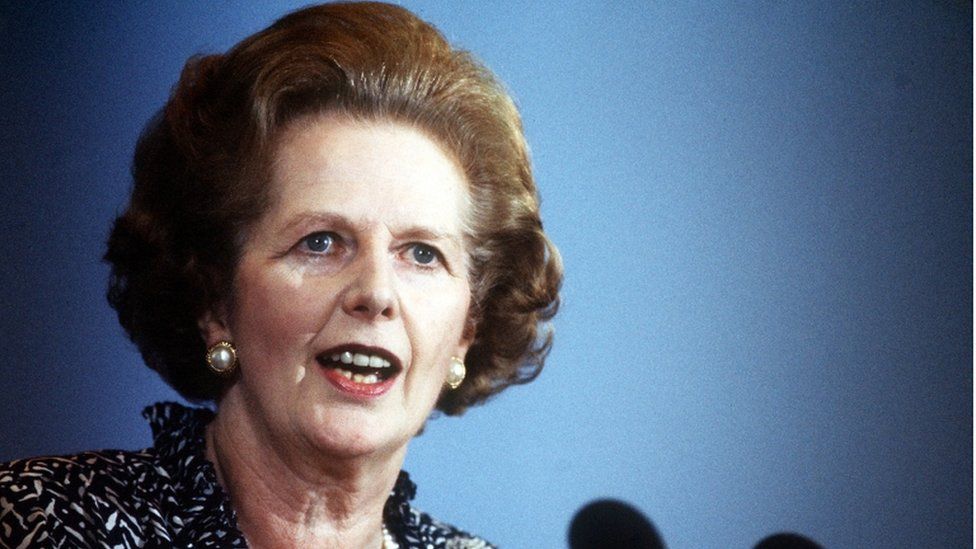Housing bodies welcome end of Right to Buy in Scotland
- Published

Selling public sector housing to sitting tenants was a signature policy of Margaret Thatcher's governments
The end of the Right to Buy scheme in Scotland after 30 years has been welcomed by housing bodies.
Nearly 500,000 council and housing association homes were sold under the policy, which was introduced by Margaret Thatcher's government in 1980.
It allowed tenants in social housing to buy their homes at discounted rates.
MSPs voted to scrap the measure in 2014 following concerns that it had contributed to an acute shortage of social housing.
Right to Buy schemes are still operating in the rest of the UK.
They allow sitting tenants to buy public-sector housing, often with a discount on the market value.
The Scottish Federation of Housing Associations (SFHA) said the end of the policy in Scotland "hasn't come a moment too soon".
Margaret Thatcher personally handed over the first council house sold in 1980
SFHA chief executive Mary Taylor said: "Right to Buy has had its day and has no place in modern Scotland.
"SFHA and its members long campaigned for an end to RTB, and warmly welcomes the end of a policy which has led to a considerable reduction in the availability of truly affordable social rented homes and contributed to the growing intergenerational inequality in terms of access to affordable quality housing.
"Going forward, we have a chance in Scotland to adopt a housing policy that is focused on the supply of well-designed, energy efficient social rented homes that are truly affordable to people on low incomes."
Right to buy facts:
* Right to Buy in Scotland was established by the Tenants’ Rights, Etc. (Scotland) Act 1980, external
* A total of 494,580 council and housing association homes were sold under the legislation
* The Scottish Parliament's Housing (Scotland) Act 2014, external provided for Right to Buy to end on 31 July 2016.
The Association of Local Authority Chief Housing Officers (ALACHO) also welcomed the end of the policy.
Policy manager Tony Cain said: "Ending the right to buy will allow social landlords to plan longer term, manage assets and income more effectively and most importantly to invest to increase the number of social rented homes for the first time since 1981.
"That means more long term jobs and apprenticeships to maintain our homes and more households taken out of housing need and living in warm, dry and genuinely affordable housing".
The Scottish Conservative housing spokesman Alex Johnstone called the decision to scrap the scheme is "political dogma".
He said: "Right to Buy has been the most effective single measure to enable a whole generation on modest incomes to take pride in owning their own property.
"It has also delivered the kind of mixed tenure communities that modern planners now seek to replicate.
"Nicola Surgeon would do well to remember that her own parents benefited from the scheme and she wouldn't be where she is today without that hand-up."
'Safeguarding stock'
The Scottish government said the move would protect the housing stock that was available for social renting.
Housing Minister Kevin Stewart said: "It is absolutely vital that people can access social housing when they need it most.
"By ending the right to buy we are protecting up to 15,500 social homes from sale over the next 10 years and safeguarding this stock for future generations."
Nearly 500,000 council and housing association homes were sold under the right to buy scheme
He added: "The Scottish government is doing everything possible to maximise our investment in housing and to deliver on our ambitious target of 50,000, affordable homes over the lifetime of this parliament, including 35,000 social homes.
"But with thousands of people on waiting lists for council and housing association houses, it was only right for us to scrap this scheme as we could no longer afford to see the social sector lose out on badly needed homes."
- Published3 July 2013
- Published16 November 2012
- Published14 April 2015